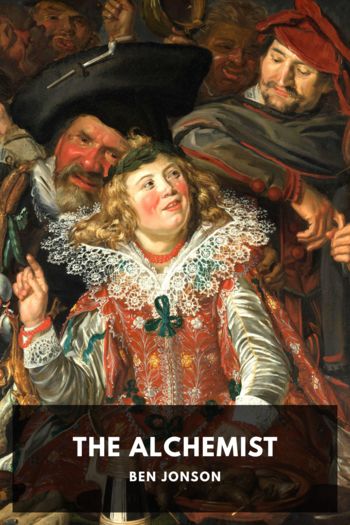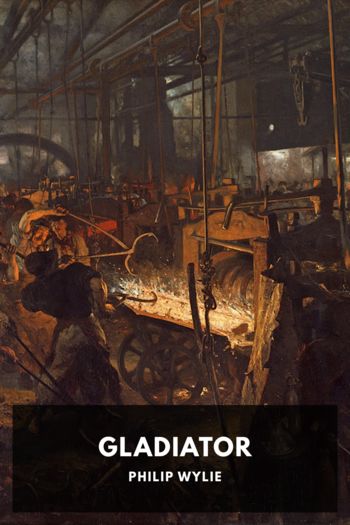Gladiator by Philip Wylie (top reads txt) 📖

- Author: Philip Wylie
- Performer: -
Book online «Gladiator by Philip Wylie (top reads txt) 📖». Author Philip Wylie
“Great God,” the scientist breathed.
“When I see them for what they are, and when they exert the tremendous bulk of their united detestation and denial against me, when I feel rage rising inside myself—can you conceive—?”
“That’s enough. I don’t want to try to think. Not of that. “
“Shall I walk to my grave afraid that I shall let go of myself, searching everything for something to absorb my energy? Shall I?”
“No.”
The professor spoke with a firm concentration. Hugo arrested himself. “Then what?”
“Did it ever dawn on you that you had missed your purpose entirely?”
The words were like cold water to Hugo. He pulled himself together with a physical effort and replied: “You mean-o that I have not guessed it so far?”
“Precisely.”
“It never occurred to me. Not that I had missed it entirely.”
“You have.”
“Then, for the love of God, what is it?”
Hardin smiled a gentle, wise smile. “Easy there. I’ll tell you. And listen well, Hugo, because to-night I feel inspired. The reason you have missed it is simple. You’ve tried to do everything single-handed—”
“On the contrary. Every kind of assistance I have enlisted has failed me utterly.”
“Except one kind.”
“Science?”
“No. Your own Kind, Hugo.”
The words did not convey their meaning for several seconds. Then Hugo gasped. “You mean—other men like me?”
“Exactly. Other men like you. Not one or two. Scores, hundreds. And women. All picked with the utmost care. Eugenic offspring. Cultivated and reared in secret by a society for the purpose. Not necessarily your children, but the children of the best parents. Perfect bodies, intellectual minds, your strength. Don’t you see it, Hugo? You are not the reformer of the old world. You are the beginning of the new. We begin with a thousand of you. Living by yourselves and multiplying, you produce your own arts and industries and ideas. The New Titans! Then—slowly—you dominate the world. Conquer and stamp out all these things to which you and I and all men of intelligence object. In the end—you are alone and supreme.”
Hugo groaned. “To make a thousand men live my life—”
“But they will not. Suppose you had been proud of your strength. Suppose you had not been compelled to keep it a secret. Suppose you could have found glorious uses for it from childhood—”
“In the mountains,” Hugo whispered, his eyes bemused, “where the sun is warm and the days long—these children growing. Even here, in this place—”
“So I thought. Don’t you see, Hugo?”
“Yes, I see. At last, thank God, I do see!” For a long time their thoughts ran wild. When they cooled, it was to formulate plans. A child taken here. Another there. A city in the jungle—the jungle had harbored races before: not only these Mayas, but the Incas, Khmers, and others. A modern city for dwellings, and these tremendous ruins would be the blocks for the nursery. They would teach them art and architecture—and science. Engineering, medicine—their own, undiscovered medicine—the new Titans, the sons of dawn—so ran their inspired imaginations.
When the night was far advanced and the camp was wrapped in slumber, they made a truce with this divine fire. They shook each other’s hands.
“Good-night, Hugo. And to-morrow we’ll go over the notes.”
“I’ll bring them.”
“Till evening, then.”
Hugo lay on his bed, more ecstatic than he had even been in his life. By and by he slept. Then, as if the ghosts of Uctotol had risen, his mind was troubled by a host, a pageant of dreams. He turned in his sleep, rending his blankets. He moaned and mumbled. When he woke, he understood that his soul had undergone another of its diametric inversions. The mad fancies of the night before had died and memory could not rekindle them. Little dreads had goaded away their brightness. Conscience was bickering inside him. Humanity was content; it would hate his new race. And the new race, being itself human, might grow top-heavy with power. If his theory about the great builders of the past was true, then perhaps this incubus would explain why the past was no more. If his Titans disagreed and made war on each other—surely that would end the earth. He quailed.
Overcome by a desire to think more about this giants scheme, he avoided Hardin. In the siesta hour he went back to his tent and procured the books wherein his father had written the second secret of life. He crammed them into his pocket and broke through the jungle. When he was beyond sight and sound, he dropped his machete and made his way as none but he could do. With his body he cut a swath toward the mountains and emerged from the green veil on to the bare rocks, panting and hot. Upward he climbed until he had gained the summit. To the west were strewn the frozen billows of the range. To the east a limitless sea of verdure. At his feet the ruins in neat miniature, like a model. Above, scalding sun and blue sky. Around him a wind, strangely chill. And silence.
He sat with his head on his hands until his thoughts were disturbed. A humid breath had risen sluggishly from the jungle floor. The sun was dull. Looking toward the horizon, he could see a black cloud. For an instant he was frightened, the transformation had been so gigantic and so soundless. He knew a sudden urgent impulse to go back to the valley. He disobeyed it and watched the coming of the storm. The first rapier of lightning through the bowels of the approaching cloud warned him again. Staunchly he stood. He had come there to think.
“I must go back—and begin this work,” he told himself. “I have found a friend!” The cloud was descending. Thunder ruminated in heaven’s garret. “It is folly,” he repeated, “folly, folly, folly in the face of God.” Now the sun went out like an extinguished lamp, and the horizon crept closer. A curtain of torrential rain was lowered in the north. “They will make the earth beautiful,” he said, and ever and again: “This thing is not beautiful. It is wrong.” His agitation increased rapidly. The cloud was closing on the mountain like a huge hand. The muscles in his legs quivered.
“If there were only a God,” he whispered, “what a prayer I would make!” Then the wind came like a visible thing, pushing its fingers over the vegetation below, and whirling up the mountain, laden with dust. After the wind, the rain—heavy, roaring rain that fell, not in separate drops, but in thick streams. The lightning was incessant. It illuminated remote, white-topped peaks, which, in the fury of the storm, appeared to be swaying. It split clouds apart, and the hurricane healed the rents. All lights went out. The world was wrapped in darkness.
Hugo clutched his precious books in the remnants of his clothing and braced himself on the bare rock. His voice roared back into the storm the sounds it gave. He flung one hand upward.
“Now—God—oh, God—if there be a God—tell me! Can I defy You? Can I defy Your world? Is this Your will? Or are You, like all mankind, impotent? Oh, God!” He put his hand to his mouth and called God like a name into the tumult above. Madness was upon him and the bitter irony with which his blood ran black was within him.
A bolt of lightning stabbed earthward. It struck Hugo, outlining him in fire. His hand slipped away from his mouth. His voice was quenched. He fell to the ground. After three days of frantic searching, Daniel Hardin came upon the incredible passage through the jungle and followed it to the mountain top. There he found the blackened body of Hugo Banner, lying face down. His clothing was burned to ashes, and an accumulation of cinders was all that remained of the notebooks. After discovering that, Professor Hardin could not forbear to glance aloft at the sun and sky. His face was saddened and perplexed.
“We will carry him yonder to Uctotol and bury him,” he said at last; “then—the work will go on.”





Comments (0)